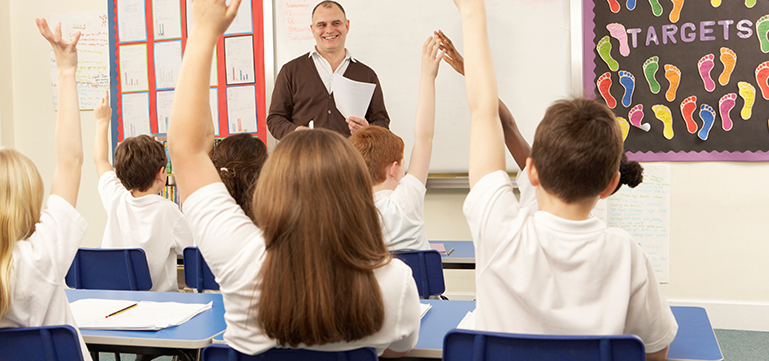Using pupil opinions in the classroom

Quick links:
Information about the school
Ysgol Gynradd Bryn Tabor is situated in the village of Coedpoeth in the county of Wrexham. Welsh is the main medium of the school and English is introduced in key stage 2. There are 274 pupils between 3 and 11 years old on roll, including 36 part-time nursery age pupils. They are divided into 11 classes.
Over the last three years, the average proportion of pupils who have been eligible for free school meals has been around 12%. This is lower than the national percentage of 18%. Around 5% of pupils come from Welsh-speaking homes. The school has identified around 21% of its pupils as having additional learning needs, which is close to the national percentage.
Context and background to the effective or innovative practice
Ysgol Bryn Tabor has encouraged pupils to express an opinion about school life for a long time. Various pupil councils, including the school council, eco council, ‘dreigiau doeth’ (the Welsh language charter council) and the digital wizards are hard-working and have a positive influence on the school’s life and work. They meet regularly and report back to pupils, staff, parents and governors about their activities and findings. A good example of the digital wizards’ work is the work that they do to organise training for pupils, parents and teachers on how to use robots. Pupils have also had input into what will be taught at the beginning of a theme or unit of work for some time. However, the school came to the conclusion that, in order to develop enterprising, creative and ambitious learners who are at the heart of the new curriculum, the ‘pupil’s voice’ needs to be develop as a central part of the school’s vision.
Description of nature of strategy or activity
There are comprehensive procedures to develop the pupil’s voice within the school. This permeates all parts of the school’s work. With the arrival of the new curriculum on the horizon, a golden opportunity was seen to experiment more and take a risk, to be creative and innovative.
The school’s planning principles are effective. Teachers within the school’s different units work and plan together very successfully. Plans are based on pupils’ ideas and include a detailed reference to the literacy and numeracy framework, skills to be developed and rich tasks. At the beginning of every unit of work, pupils are given an opportunity to choose the class’s theme. In the foundation phase, pupils bring in three objects to represent what they would like to learn more about. By key stage 2, homework tasks are used to engage their interest. Pupils vote to see which theme is most popular, and teachers plan carefully and identify what pupils would like to learn during the theme.
Pupils’ ideas inform the curriculum. Teachers support pupils to choose, devise and develop challenges for the class areas. As the process has developed, pupils’ ideas have evolved to become more varied and creative. Pupils also choose the level of challenge in their tasks.
What impact has this work had on provision and learners’ standards?
Teachers address recent developments in education enthusiastically and look for opportunities to develop professionally. They work effectively with teachers from other schools and attend relevant training. This leads to developing new activities to trial and develop within the classroom. Staff’s commitment to listening to the pupil’s voice and introduce new strategies that promote independent learning contributes exceptionally to high levels of motivation and interest in their work.
Developing these working methods has had a beneficial effect on staff’s professional development. They show a strong commitment to continuous and sustainable improvements by working and planning together. This has helped to reduce the workload.
Provision has a very positive effect on learners’ skills. The effect on wellbeing and attitudes to learning is excellent:
- Pupils take pride in having a strong voice in what they learn.
- Pupils’ enthusiasm and commitment to their work have improved.
- Most pupils have very positive attitudes to learning.
- Nearly all pupils work extremely conscientious on tasks, concentrate for extended periods and persevere excellently to complete their tasks.
How have you shared your good practice?
The school’s staff continue to work together, plan jointly and share good practice within the school. The school takes part in school-to-school activities, and staff share good practice at consortium level.